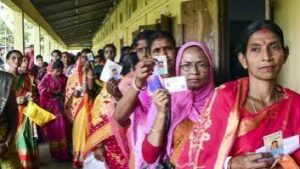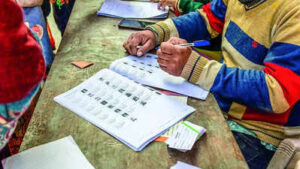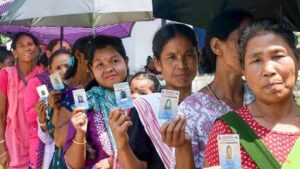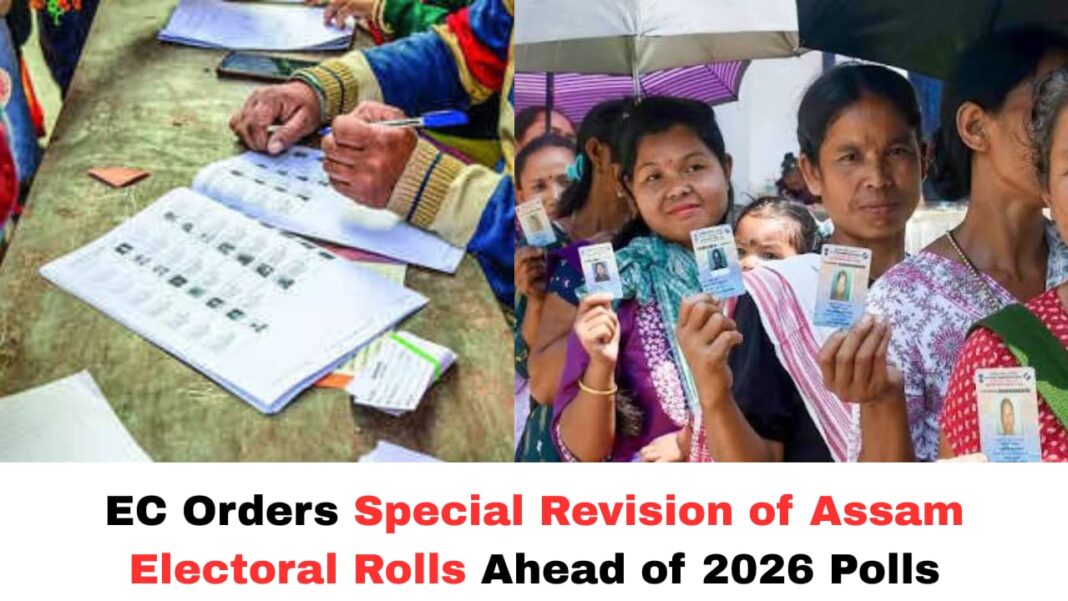Digital New Guru Assam Desk:
Assam Election Prep: ECI Launches Special Revision of Voter List
As Assam prepares for its next round of assembly elections, the Election Commission of India (ECI) has launched a rigorous revision of the state’s voter list. On November 17, 2025, the ECI ordered a Special Revision (SR) of electoral rolls in Assam, setting 1 January 2026 as the qualifying date.
This initiative comes amid mounting concerns about outdated voter records, demographic shifts, and the need for more accurate electoral data in a politically sensitive state.
What the Revision Entails
The ECI’s plan is structured and time-bound. Booth Level Officers (BLOs) will conduct door-to-door verification from 22 November to 20 December 2025, using pre-filled registers rather than traditional enumeration forms, a method meant to boost accuracy and efficiency.

Under this exercise:
- The integrated draft electoral roll will be published on 27 December 2025.
- Citizens can file claims and objections between 27 December and 22 January 2026.
- The final updated voter list is scheduled for publication on 10 February 2026.
Why This Revision Is Different
This is not a routine update. The ECI has explained that this Special Revision is a hybrid process, falling between the regular Special Summary Revision and the more exhaustive Special Intensive Revision (SIR).
Unlike the SIR, which typically involves extensive enumeration, this SR focuses on verification against pre-existing voter data. BLOs will check details like duplicate entries, dead or shifted voters, and data consistency — all with an eye to “cleaning up” the electoral roll.
Also notable: individuals classified as D-Voters (doubtful voters, often under scrutiny for citizenship status) will not undergo full re-verification in this SR. Instead, their data — such as name, age, and photograph — will be carried forward into the draft roll without changes, unless legally ordered otherwise.
On-Ground Mapping: Creating an Accurate Voter Landscape
Ahead of the official revision, the ECI has already begun a pre-SIR voter mapping exercise across the state. This is a critical preparatory step to ensure the SR runs smoothly.
Key features of the mapping effort:
- BLOs are asked to assign or verify house numbers, identify houses without numbers, and correct address data.
- They are creating special categories:
- People aged 100 years or more are being listed separately.
- Houses with 10 or more registered voters are being flagged.
- First-time voters are also being accounted for meticulously.
To validate voters, BLOs are collecting documentation: birth certificates, photographs, parent voter ID cards, proof of address. For removing voters, death certificates are being required.
Importantly, this mapping exercise is the first comprehensive voter list update since Assam’s 2023 delimitation, which redrew boundaries across the state’s 126 assembly constituencies.

The NRC Factor: Politics Meets Verification
One of the most politically charged aspects of this roll update is Assam’s push to incorporate National Register of Citizens (NRC) data into the process. The Assam government has formally requested that the ECI integrate NRC-verified records into the SR.
Why this matters:
- Assam is the only Indian state that completed an NRC exercise, which sought to identify genuine Indian citizens.
- The state argues that the NRC’s rigorous verification process should serve as a foundation for the electoral roll update, thereby improving its credibility.
- Officials want the NRC register to be accepted as proof of citizenship during the SR.
However, doubts remain: the NRC has itself been controversial. Thousands of people were excluded from its final draft, and questions remain on both accuracy and inclusion.
Challenges & Controversies Ahead
While the ECI’s efforts are being framed as a push for a “cleaner” electoral roll, the process is not without its challenges:
- Credibility and Inclusion
Ensuring that eligible voters are not disenfranchised is critical. The use of pre-filled registers reduces the risk of omission, but the reliance on existing data may also risk perpetuating past inaccuracies. - Citizenship Disputes
The NRC integration proposal has stirred political debate. Critics worry that using NRC data could exclude vulnerable populations or reignite divisive citizenship discourses. Supporters, on the other hand, argue it would enhance voter list integrity. - Timing Tensions
Some in Assam have suggested postponing the SIR until after the assembly elections and only once the NRC process is formally completed. Whether the ECI will accommodate this remains to be seen. - Administrative Burden
Carrying out detailed verification across the state demands significant manpower, resources, and logistical coordination. BLOs will need to navigate complex tasks from mapping legacy voters to gathering legal documents.
Why This Roll Revision Is Significant
- Electoral Integrity: The SR aims to weed out duplicates, inactive voters, and incorrect entries — strengthening the legitimacy of Assam’s voter list.
- Political Impact: With elections on the horizon, accurate rolls can shape voter outreach, campaign strategies, and even representation outcomes.
- Transparency: Publishing a draft list, allowing objections, and then releasing a final roll are steps that reinforce democratic accountability.
- Long-Term Precedent: If NRC data is used effectively, it could set a precedent for how citizenship records are leveraged in electoral processes in other states.

Looking Ahead
The timeline for Assam’s electoral overhaul is clear: BLOs wrap up field verification by December 20, the draft list goes live on 27 December, and the final voter roll will be out by 10 February 2026.
In the grander scheme, this process represents more than administrative housekeeping — it is a crucial step in balancing citizenship legitimacy, electoral fairness, and political representation in a state with a deeply contested demographic history.
As Assam moves into its next electoral phase, the success of this revision will be judged not only by numbers on paper, but by how accurately and inclusively it reflects its people’s voice.
You May Also Read: Rohini Acharya Quits Politics, Disowns the Yadav Family








